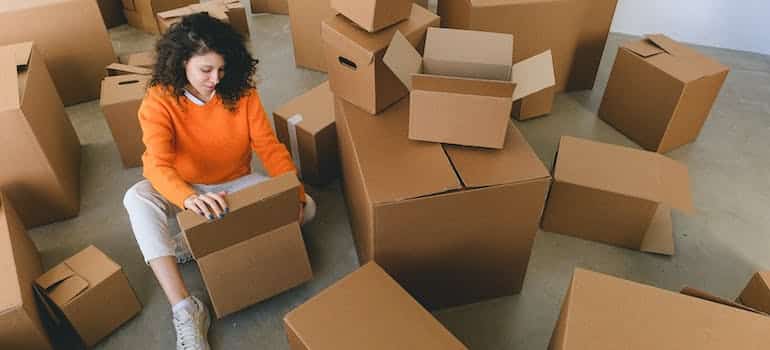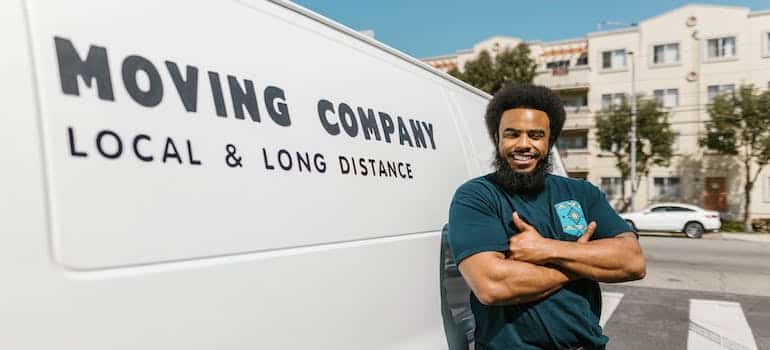Moving within this sunny state presents unique challenges. From the humid climate to the bustling cities, each aspect of local relocation in Florida demands careful consideration. As Florida movers, we understand that a successful move requires more than just transporting your belongings. It’s about meticulous planning and organization. Whether you’re moving to a beachside community or a vibrant city center, being well-prepared is key. In this guide, we’ll navigate these challenges together, ensuring your move is as smooth as Florida’s sandy beaches.
Understanding Florida’s local moving landscape
Navigating a local move in Florida, particularly with local movers in Miami Beach, requires an understanding of the state’s unique moving landscape. In Miami Beach, the sunny, tropical climate is a key factor. Moving in the cooler months can be more comfortable than during the hot, humid summer. However, it’s important to consider Florida’s hurricane season, which runs from June to November. This period can bring unpredictable weather, potentially affecting your moving plans.

In Florida, the peak moving times are usually during the summer, aligning with school breaks. This high demand can lead to increased costs and reduced availability of moving services. Planning your move for off-peak periods, like fall or spring, might offer more flexibility and better rates. A common issue, especially in bustling areas like Miami Beach, is traffic. The congestion can significantly impact moving schedules. Additionally, the unique layout of some neighborhoods, with narrow streets and limited parking, can pose challenges for moving trucks. By being aware of these factors and openly discussing them with your movers, you can plan more effectively, ensuring a smoother and more efficient local move in Florida.
Pre-move planning
When planning a move in Florida, getting organized early is crucial. For that reason, local movers Fort Lauderdale recommend creating a Florida-specific moving timeline. This should account for the state’s climate and peak moving periods. Starting a few months in advance allows you to avoid the rush and possibly secure better rates. Deciding what to take and what to leave behind is another key step. Consider Florida’s weather and lifestyle. Maybe you won’t need those heavy winter clothes anymore. Think about the size of your new home, too. If it’s smaller, you might need to downsize your belongings. Selling or donating items you no longer need can simplify your move and reduce costs.

When it comes to hiring local moving services, research is essential. Look for movers with good reviews and experience in Florida. They should understand the local challenges, such as navigating Fort Lauderdale’s busy streets or dealing with humid conditions. Get quotes from several companies to compare prices and services. Remember, the cheapest option isn’t always the best. Look for a balance of cost, services offered, and reliability. This pre-move planning sets the stage for a smoother relocation in Florida.
Packing strategies for Florida weather
When packing for a move in Florida’s unique climate, local movers West Palm Beach advise using specific materials to protect your belongings. They recommend sturdy, waterproof containers to guard against humidity and sudden rain showers common in the region. For delicate items like electronics or artwork, consider using plastic wrap and silica gel packets to absorb moisture. Additionally, wrapping furniture in plastic can prevent water damage during unexpected downpours.

On the other hand, experts from local moving companies Coral Springs FL, emphasize the importance of organizing belongings for both efficiency and ease. They suggest labeling boxes clearly by room and contents, which makes unpacking in your new home much simpler. For delicate items, like glassware or heirlooms, use bubble wrap and sturdy boxes, and label these boxes as ‘fragile’ to ensure careful handling. Grouping similar items together, like books or kitchenware, not only makes packing easier but also helps with the organization during the unpacking process. By following these strategies, advised by experienced movers familiar with Florida’s weather and conditions, you can ensure your belongings are well-protected, and your move is as smooth and stress-free as possible.
Hiring the right moving company
Choosing the right moving company is a crucial step in your relocation process, especially in Florida. When researching local movers Boca Raton or other Florida cities, start by seeking recommendations from friends or family who have recently moved. Online reviews and ratings on websites can also provide valuable insights into the quality of service provided by different companies. Understanding the pricing structures of local movers is important. In Florida, moving companies might charge based on the volume of your belongings, the distance of your move, or the time it takes to complete it. Some companies may offer flat rates for local moves, while others charge hourly. Be sure to get a detailed breakdown of the costs to avoid any unexpected charges. Ask about any additional fees, like for large items or accessing difficult locations.

It’s essential to verify that the moving company is licensed and insured. In Florida, legitimate movers should have a state license. Insurance is also crucial. It protects your belongings in case of damage or loss during the move. Don’t hesitate to ask for proof of insurance and check their policy details. Local movers in Florida should be well-versed in handling the unique challenges of moving in this region. They should know how to deal with the state’s weather conditions and be familiar with local regulations and routes.
Money-saving tips for local relocation in Florida
Moving can be expensive, but with the right strategies, you can save money. Reliable local movers Pembroke Pines often recommend several cost-saving tips for local moves. One effective way to minimize moving costs is by decluttering before you move. Selling or donating items you no longer need can reduce the volume of your belongings, potentially lowering your moving costs. Another tip is to gather free packing supplies. You can find boxes and packing materials at local stores or from friends who have recently moved, saving you the expense of buying new ones.

Deciding between a DIY move and hiring professionals has its pros and cons. A DIY move can be cheaper but requires more effort and time. You’ll need to pack, load, transport, and unload everything yourself. In contrast, hiring professional movers, while more expensive, offers convenience and efficiency. Professionals handle the heavy lifting and logistics, reducing the risk of damage and stress. It’s also important to obtain and compare multiple moving quotes. Don’t settle for the first quote you receive. Reach out to different moving companies, and ask for detailed estimates. Compare these quotes not only based on price but also on services offered. Be wary of quotes that seem too good to be true, as they might not include all costs or might be from less reputable movers.
Moving day essentials
Moving day can be hectic, but with the right preparation, it can go smoothly, especially in a place like Florida. Experienced local movers Deerfield Beach often share essential tips for handling a moving day effectively. Firstly, preparing for Florida’s weather is crucial. The state is known for its hot and sometimes unpredictable weather. Wear comfortable, breathable clothing and have plenty of water on hand to stay hydrated. If you’re moving during the rainy season, keep raincoats and umbrellas close by. Also, protect your belongings from potential rain by waterproofing boxes and securing loose items.
Keeping essential items on hand during the move is important. Prepare a moving day kit with essentials like snacks, water, a first-aid kit, chargers for your devices, and important documents. Having these items easily accessible will save you from searching through boxes when you need them. Coordinating with your movers is key to a successful moving day. Communication is essential. Make sure you have the contact information of the moving crew and provide them with clear directions to your new home. Discuss the moving plan with them so everyone knows the schedule and any special instructions for certain items. Being present during the move to oversee the process and answer any questions the movers might have is equally important. Ensure to be ready for the moving day, and rest assured that you will have a stress-free relocation process.
Dealing with unforeseen circumstances
Moving can often come with unexpected challenges, but being prepared can make these situations more manageable. Dealing with unforeseen circumstances effectively is key to a smoother moving experience. When facing moving delays or issues, the first step is to stay calm and communicate with your moving company. Delays can happen due to weather, traffic, or logistical challenges. It’s important to understand the terms of your agreement with the movers, as this will guide your actions in these situations. If the delay is on the moving company’s part, inquire about their policies for compensating for lost time or rescheduling.

Understanding your rights and responsibilities during a move in Florida is also crucial. Florida has specific regulations governing moving companies and consumer rights. Familiarize yourself with these to ensure your move is compliant and to know what to expect from your moving service. For example, you have the right to a written estimate and the right to file a complaint to the Florida Department of Agriculture and Consumer Services if services are not as promised. There are numerous resources available for help and support during your move. Local consumer protection agencies can provide guidance if you encounter issues with your moving company. Online forums and community groups can offer advice and personal experiences that might be helpful. Additionally, legal resources are available if you need to understand the legal aspects of moving in Florida.
Post-move checklist
After your local move in Florida, it’s crucial to settle into your new home effectively. Here’s a post-move checklist to help you organize and streamline the process:
- Update your address: First, change your address with the U.S. Postal Service, banks, and any subscriptions. This ensures your mail reaches you and keeps your accounts up-to-date. For example, if you’ve moved from Miami to Orlando, inform your bank to avoid any issues with location-based security measures.
- Utilities and services setup: Ensure your utilities, like water, electricity, and internet, are functioning in your new home. Contact service providers in advance to arrange this. For instance, setting up your internet connection before moving allows you to stay connected as soon as you arrive.
- Explore local amenities: Familiarize yourself with your new area. Find the nearest grocery stores, hospitals, and schools. If you’ve moved to Tampa, for example, explore the different neighborhoods to find your nearest essentials.
- Safety measures: Check all smoke detectors and security systems in your new home. It’s important for safety and peace of mind. In a place like Jacksonville, where the climate can be humid, also ensure that your home is mold-free and the air conditioning is working well.
Be prepared, and you will have a stress-free local relocation in Florida
Overall, being well-prepared is the key to a stress-free local relocation in Florida. By understanding the unique challenges of moving in this region, from the humid climate to the busy peak seasons, and by meticulously planning each step, you can significantly reduce the stress associated with moving. Hiring the right moving company, packing smartly for the weather, and being proactive in handling any unforeseen circumstances are crucial elements of a successful move. Remember, knowledge is power – familiarizing yourself with your rights and available resources can provide peace of mind. With careful planning and a positive mindset, your local move in Florida can be a smooth and even enjoyable journey to your new home.
